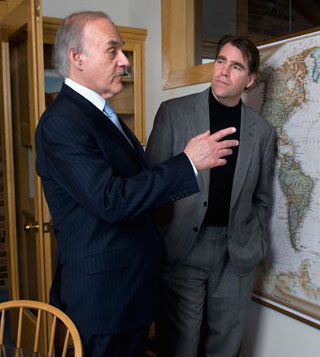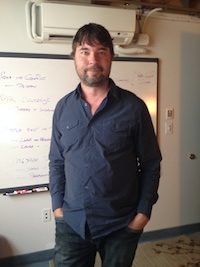GlobalPosta new entry
GlobalPost was born as a response to the shuttering of overseas bureaus by major US news organizations. The Internet had cut into traditional revenue streams and many news outlets had been obliged to close some or all of their foreign operations. Philip S. Balboni had recently stepped down as president of the Boston-based cable news channel he founded, New England Cable News. Charles Sennott was a longtime foreign correspondent for the Boston Globe . Together, they conceived of GlobalPost , an online-only international news company, to fill the gap.

© Jodi Hilton for the New York Times,
Phil Balboni (l) and Charles Sennott (r)
Balboni and Sennott set up shop in April 2008 in a renovated waterfront building in Boston. Balboni was president and CEO; Sennott vice president and executive editor. The website went live on January 12, 2009. GlobalPost ’s goal, as the mission statement put it, was “to help fill the enormous void that has grown up in coverage of the world by US news organizations. More than ever before in history, we need knowledge of other countries and of the global forces that are impacting our economy, our environment, and our very security.” [1] It pledged to maintain traditional US standards of journalistic impartiality, and that its reports would be “fair, intelligent, comprehensive and free of partisanship.” It continued:
GlobalPost follows no political line. We encourage our correspondents to write with a strong voice and to work hard to unearth facts. But we leave opinion on the opinion pages.
Over time, Sennott built a team of Boston-based editors (eventually 10-12) and more than 70 correspondents in 50 countries. At first, GlobalPost used freelancers. But the freelancer model proved difficult: there was high turnover, which meant limited opportunity to build relationships with contributors; and editors could not easily assess the trustworthiness of submitted articles. The pay scale was low: about $250 per article. Typically, GP paid a freelancer $1,000 a month for four stories, but it was not a retainer: if s/he filed only three, the payment would be $750. No freelancer contributed principally to GP because that was not enough income to live on.
So in 2010, GP modified its approach. As a first step, it increased the per-story fee. It also designated seven contributors as “senior correspondent.” [2] Those individuals filed principally for GP, and were paid on average $50,000 a year. By early 2013, GP had 13 senior contributors around the world, and about 50 so-called “network correspondents.” It still accepted contributions on a limited basis from some 100-120 freelancers a month. The writers reported to five geographic desks: Middle East, Africa, Asia-Pacific, the Americas, and Europe. Story categories were business, politics, culture, the environment and war.

Editor Tom Mucha
The editorial management structure was notably flat. [3] Thomas Mucha was hired in October 2008 as managing editor. In November 2010, he was promoted to editor (assuming Sennott’s daily editorial responsibilities). With a background in international business economics, Mucha had worked in television as well as at magazines before joining GP. There was also a managing editor, a video producer, an editor for each regional desk, and a couple of deputy editors. The regional editors were the point of contact for reporters in the field. But the newsroom was small and editors sat near one another. All could—and did—confer easily with the group. “For quality control, we try to put as many eyeballs on [copy] as possible,” says Mucha. “It’s a very inclusive environment here, a roll-up-your-sleeves kind of place.” [4]
On the business side, GP’s website traffic grew steadily: in 2011, it attracted more than 20 million unique visitors, double the number in 2010; by 2012, that number was nearing 3 million a month, or 36 million a year. [5] Its revenue—which the privately held company kept confidential—came from advertisements on the website, subscriptions, and syndicated products. It formed affiliate relationships with traditional news organizations, from CBS News to the PBS NewsHour and NPR. It also provided content to US and international newspapers and magazines.
Conflict . To send a GP reporter into a conflict situation required sign-off by several individuals. Usually, the correspondent proposed a reporting trip to the regional editor. That editor would take it to the managing editor, who would discuss it with Mucha or even with Balboni. “It could go to five people,” comments Mucha.
GP provided hazard training to those reporting from war zones. They were also given protective gear as needed, from flak jackets to gas masks. GP also required that the reporters on assignment in conflict areas check in regularly—usually twice a day. This could mean a phone call, email or text. GP also made it a policy not to accept stories from unknown writers in conflict zones because it it realized it had created a perverse incentive for reporters to go into danger. Explains Middle East Editor Peter Gelling: “We were signaling to freelancers that if they get into Syria and out alive, they can potentially sell us stories, and we didn’t want to encourage that.” [6] Adds Mucha:
We don’t take stories from people in conflict zones that we don’t know and haven’t sent in and aren’t working with closely… We take responsibility for our people.
[1 ] See: http://www.globalpost.com/mission/mission-statement
[ 2 ] The seven were based in Afghanistan, Russia, India, Brazil, China, Kenya and Thailand.
[ 3 ] See Appendix 1 for an editorial list.
[4 ] Author’s telephone interview with Thomas Mucha on October 15, 2014. All further quotes from Mucha, unless otherwise attributed, are from this interview.
[ 5] Ken Doctor, “The newsonomics of big and little, from NBC News and GlobalPost to Thunderdome,” Nieman Lab , August 29, 2013. See: http://www.niemanlab.org/2013/08/the-newsonomics-of-big-and-little-from-nbc-news-and-globalpost-to-thunderdome/
[ 6 ] A uthor’s interview with Peter Gelling on September 22, 2014, in Boston. All further quotes from Gelling, unless otherwise attributed, are from this interview.